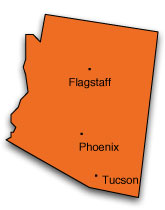McCain Calls Arizona a Swing State
Jul 31, 202026.9K Shares586.6K Views
PHOENIX–Sen. John McCain’s big struggle to energizea suspicious conservative Republican base and attract crucial independent voters is a national fight that encompasses his home state of Arizona. Despite representing the state in Congress for 26 years, McCain is now confronting a resurgent state Democratic Party and a burgeoning number of unpredictable independent voters.
While Arizona Republicans are bogged down with nasty infighting and a slumping number of registered voters, Arizona Democrats are gaining voters daily. Powered by Sen. Barack Obama’s voter registration drive, Democratic voter registration is up 2.8 percent in the last year and Democrats are poised to gain control of a majority of the state’s House congressional delegation for the first time in decades.
The biggest shift in the Arizona political landscape has been in the number of voters registering as independents — up 7.6 percent in the last year. Arizona is now essentially a tri-party state — Republicans make up 38 percent of registered voters; Democrats, 34 percent, and independents, 27 percent. Securing a plurality of independents will be crucial to the presidential race here and Obama has the early edge. Without the enthusiastic support of rank-and-file Republicans, McCain could face a desert dogfight that could wind up costing him the White House in a close contest.
In a clear signal that Arizona’s 10 electoral votes are up for grabs, the McCain campaign has added Arizona to its list of 24 “battleground states” with their 242 electoral votes.
In a “strategy briefing” video posted Saturday on the McCain campaign website, Rick Davis, the campaign manager, did not include Arizona as one of the 17 “historically Republican states” — though Arizona has voted Republican in every presidential election but one since 1952. In that one election, of 1996, Bill Clinton carried Arizona by a 2.2 percent margin over Sen. Robert Dole.
In the briefing, Davis avoided mentioning Arizona in his breakdown of McCain’s electoral strategy. But he did include Arizona among swing states. "In the Southwest," Davis says in the video, "McCain’s history in the region with over 25 years representing the state in Washington combined with his strength with Latinos and his record on immigration, makes him a natural Western state candidate.”
A call to McCain campaign headquarters seeking comment on Arizona being placed as a contested state was not returned.
Arizona polls taken in April and May showed McCain defeating Obama by 11 points – a smaller margin than many expected for Arizona’s favorite son. Pollsters are split on whether the narrow lead signals the possibility that Arizona could slip away from McCain, just as Democratic nominee Al Gore was unable to secure his home state of Tennessee in the 2000 election.
McCain had a 50-39 percent lead over Obama in a Phoenix-based Behavior Research Center poll taken late last month – two weeks before Obama clinched enough delegates to secure the Democratic presidential nomination. McCain’s relatively narrow lead over Obama surprised Behavior Research Center director Earl de Berg. “Why isn’t he getting 63 or 64 percent of the vote?” de Berg asked. “We are going to watch this number with great intensity.”
Arizona, de Berg said, is shaping up to be a “battleground state in a significant way, particularly because independents are expected to play such a key role.” De Berg made his comments about Arizona being in play the day before the McCain campaign moved the state into battleground territory.
The Tucson Republican pollster Margaret Kenski also asserts that McCain will carry his home state with at least 55 percent of the vote. But, she said, McCain must contend with deep dissatisfaction among Arizona’s Republicans.
The question remains how much support can he muster at the grass-roots level, which is vital in turning out the vote. “They have very mixed feelings about him at best,” she said.
Those mixed feelings of many Arizona Republicans turn to outright contempt when they consider McCain’s immigration policy. They are furious over his bipartisan effort — with Sen. Edward M. Kennedy (D-Mass.), the man who GOP conservatives have long despised — to pass a reform bill that included an opportunity for amnesty-in-all-but-name for millions of illegal immigrants. The legislation died June 28, last year.
McCain’s support of the bill split the Arizona GOP. Last year, the state party chairman, Randy Pullen, denounced McCain for backing the legislation. In a rebuke to President George W. Bush, who had campaigned across the country in support of the bill, and also to McCain, the Republican National Committee last August passed a Pullen-sponsored resolution that called for Congress to pass immigration legislation that secures the border without any form of amnesty.
McCain has since dropped his strong support for the immigration bill — he declared in January that he would not vote for the bill he once co-sponsored — and now says he supports first securing the border. At the same time, McCain has not called for massive deportations of the estimated 12 million illegal immigrants currently in the United States, and his statements suggest he will support legislation to allow "guest workers" to remain in the country.
The ugly split within the GOP is clearly not something McCain has forgotten. In fact, he has launched a campaign to silence his conservative critics who live, literally, in his back yard. So, rather than marshalling party support for the general election, McCain’s backers now have to spend time and money in his home state putting out a brush fire of discontent before it flames up into a conflagration.
The Arizona GOP’s open rebellion against McCain is rooted in the wealthy neighborhoods of Legislative District 11 — which includes McCain’s home precinct. The district’s GOP chairman, Rob Haney, has led a strident attack on McCain over immigration, as well as his support of campaign finance reform and original refusal to back Bush’s tax cuts. In 2005, Haney helped pass a resolution censuring McCain for abandoning conservative principles in both District 11 and the Maricopa County GOP.
Haney says McCain continues to ignore conservative Republicans in his presidential campaign, instead focusing on independents and disaffected Democrats. “He’s thrown conservative Republicans under the bus,” Haney said.
McCain’s Arizona supporters are now seeking to remove critics like Pullen, Haney and other opponents from District 11 leadership posts. They are running a slate of 200 candidates for the 463 precinct committeeman posts up for election in September. Rarely do precinct committeeman positions attract any opposition — let alone a coordinated, well-financed campaign that McCain’s supporters initiated.
The seriousness of McCain’s effort is demonstrated by the list of candidates vying for what are normally considered low-level party positions. There are two former Arizona governors — J. Fife Symington III and Jane Hull – as well as some of the state’s wealthiest and most powerful business leaders.
Silencing McCain’s ideological critics in Arizona, Haney said, will make it easier for McCain to appeal to independents and disaffected Democrats.
Davis, the McCain campaign manager, acknowledged Saturday that the campaign is targeting these voters. “We need to reach out to independents and disaffected Democrats because they now represent the largest proportion of swing voters and greatest electoral block up for grabs,” Davis states.
McCain’s maverick image and home state advantage has not yet translated into decisive support from Arizona independents. Instead, McCain trailed Obama by a 43 percent to 41 percent margin in the Center for Behavior Research poll conducted between May 12-20, with a 4 percent margin of error.
This battle for Arizona’s independent voters may come down to what is considered more important: Ending the war in Iraq or turning around the struggling economy.
Independents leaned heavily towards the then two Democratic contenders when asked in late May which of the three candidates would do the best job of getting the U.S. out of the war. Only 25 percent of the independents supported McCain, while 53 percent thought that the two Democratic contenders would do a better job.
McCain, however, has more support from those independents that think he would do a better job managing the economy than did either Democratic contender, de Berg said.
If it comes down to pocket-book issues, McCain will need more support from independent power brokers like the Arizona grocery-store magnate Eddie Basha. A former Democratic gubernatorial nominee, who lost to Symington 1994, Basha announced in January that he was supporting McCain and joined McCain’s finance committee.
Basha said he endorsed McCain because of concern about the Democratic Party’s economic policies, which, the grocery-store owner described as “too socialistically oriented.” Basha, whose family operates Arizona’s largest independent grocery chain, also said that Arizona would benefit financially from a McCain presidency.
Basha, however, is quick to point out that his support for McCain “is based purely on a business perspective.” “This isn’t an enduring loyalty,” Basha said.
Basha’s narrow and causal relationship with McCain is the type of independent voter the McCain campaign hopes to attract. “If he can win over people like Eddie Basha, then he will win the race,” said former Arizona Atty. Gen. Grant Woods, a moderate Republican.
Woods, who served as McCain’s first chief of staff in 1982, said McCain’s ability to attract independent voters depends on how well he distances himself from Bush. "If you are linked in peoples’ minds as another George Bush," Woods said, "you are going to lose. He has to break out of that mold.”
McCain’s unwavering support of the war in Iraq will make severing all ties to Bush virtually impossible. Combined with malaise among the GOP grass-roots, it may make it challenging for McCain to rally the troops to jawbone Arizona independents into his camp.
"We are going to vote for McCain,” Haney said, talking about the state’s disgruntled conservative Republicans. “But you are not going to energize the party with a McCain candidacy.”

Paula M. Graham
Reviewer
Latest Articles
Popular Articles

